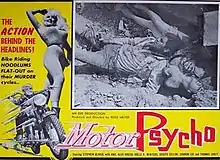Motorpsycho (film)
Motorpsycho or Motor Psycho is a 1965 film by Russ Meyer. Made just prior to Meyer's better-known Faster, Pussycat! Kill! Kill! (1965), the film explores similar themes of sex and violence, but focuses on a male motorcycle gang, unlike the female gang of go-go dancers featured in Faster, Pussycat!. Motorpsycho is also notable for containing one of the first portrayals of a disturbed Vietnam veteran character in film.
| Motorpsycho | |
|---|---|
 Theatrical release poster | |
| Directed by | Russ Meyer |
| Produced by | Eve Meyer Russ Meyer |
| Written by | James Griffith Hal Hopper Russ Meyer W. E. Sprague |
| Starring | Alex Rocco Haji Joseph Cellini Arshalouis Aivazian Richard S. Brummer George Costello Coleman Francis Sharon Lee Steve Masters Russ Meyer Stephen Oliver F. Rufus Owens Thomas Scott Holle K. Winters |
| Music by | Paul Sawtell (uncredited) Bert Shefter (uncredited) Sidney Cutner (stock music) (uncredited) |
| Cinematography | Russ Meyer |
| Edited by | Russ Meyer Charles G. Schelling |
| Distributed by | Eve Productions Inc. |
Release date |
|
Running time | 74 min. |
| Country | United States |
| Language | English |
Plot
The story involves a veterinarian whose wife is raped by a motorcycle gang led by a sadistic Vietnam veteran. After the gang kills an old man, his wife teams up with the veterinarian to hunt down the gang.
Cast
- Haji as Ruby Bonner
- Alex Rocco as Cory Maddox
- Stephen Oliver as Brahmin
- Holle K. Winters as Gail Maddox
- Joseph Cellini as Dante
- Thomas Scott as Slick
- Coleman Francis as Harry Bonner
- Sharon Lee as Jessica Fannin
- Steve Masters as Frank
- Arshalouis Aivazian as Wife
- E. E. Meyer as Sheriff
- George Costello as Doctor
Production
Russ Meyer was having trouble with the censor board because of his films so decided to make a more action oriented movie.[1] The working title of the film was Rio Vengeance.
Haji was a dancer at a nightclub when she heard about auditions for one film. Meyer cast her in one role but liked her so much he promoted her to one of the leads. She later recalled:
Russ worked with a five-man crew, and he took us all into the desert with snakes, lizards, and all kinds of danger. He thought if you were a guy, you could live in a tent out in the desert, but the ladies he treated better. We lived in a trailer. When you shoot in the desert, you come back with dirt in your eyelashes and hair. Our shower was a big barrel with a cork in it, set up on four sticks. You pulled the cork out, got wet, stuck the cork back in, soaped up, pulled the cork back out, rinsed off, and that was it![2]
Two actors were injured while filming a scene involving motorbikes and wound up in hospital.[3]
Reception
According to Meyer, the film went "through the roof [commercially]. So I said, `Well, let's do one with three bad girls'." This led to Faster Pussycat! Kill! Kill!.[4]
The Los Angeles Times said it and Faster Pussycat "pack as much sex and violence as possible on the screen without bringing in the police. In fact, they're so ludicrously erotic and sadistic they can be taken as parodies of the entire genre of exploitation pictures."[5]
Legacy
Norwegian band Motorpsycho picked their name after watching this movie in a Russ Meyer triple feature. There was already a band named after Mudhoney and a band named after Faster, Pussycat! Kill! Kill! – the other two films on the triple feature – so they used "Motorpsycho".
There are references to Faster, Pussycat! Kill! Kill! in the song "Thunder Kiss '65" by White Zombie. The song also uses the phrase "motorpsycho", a popular pun on the word motorcycle that predates the movie (Peter Phillips' 1961/62 painting "Motorpsycho/Tiger" being one notable example).
References
- "In the Know". Turner Classic Movies.
- "Interview with Haji". Shock Cinema. September 1969.
- RUSS MEYER, ONE-MAN MOVIE MACHINE, IS AT IT AGAIN Lees, David; Berkowitz, Stan. Los Angeles Times 7 Jan 1979: o18.
- Trashmeister persists in stirring tempest in a D-cup By Rob Salem Toronto Star 8 Dec 1995: E.3.
- Sadism Rampant in Double Bill Thomas, Kevin. Los Angeles Times 11 Mar 1966: c11.
External links
- Motor Psycho at IMDb
- Motorpsycho at AllMovie
- Motorpsycho at TCMDB
- Motorpsycho at Letterboxd